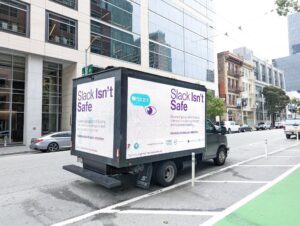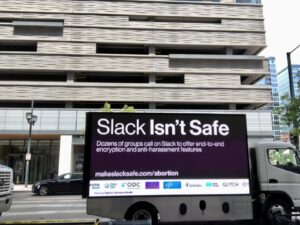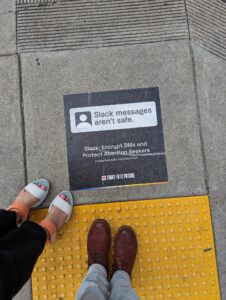MOBILE BILLBOARDS AROUND SLACK’S DENVER AND SAN FRANCISCO HQ’S DEMAND COMPANY ADDRESS SAFETY CONCERNS
For immediate release: May 31, 2023
Denver - Caitlin Seeley George, caitlin@fightforthefuture.org, 303-594-4321 San Francisco - Reem Suleiman, reems@mozillafoundation.org, 510-393-0226
The mobile billboards highlight a letter signed by 90+ organizations that demand Slack offer end-to-end encryption and blocking/reporting features to protect users in post-Roe U.S. and around the world


Today, Fight for the Future and Mozilla ran mobile billboards around Slack’s San Francisco and Denver headquarters to highlight their letter from more than 90 organizations calling on Slack to offer end-to-end encryption and blocking and reporting features, to ensure user safety. The mobile billboards signify an amplification of pressure on the company and aim to get more public attention on the issue.
“Slack is falling short in terms of the most basic guardrails for platform safety and privacy, which could have seismic implications for users. End-to-end encryption keeps people safe, and safety must be a built-in feature on all of our platforms. By not addressing this security flaw, Slack is aiding the criminalization of abortions and other expressions of bodily autonomy. As a leader in the online messaging space, Slack has to do more than just run nice PR campaigns claiming to support reproductive rights, they must ensure user safety is inherent in their tech.” Caitlin Seeley George, Campaigns and Managing Director at Fight for the Future.
“Slack has become one of the most popular communications tools of our era. And with that popularity comes responsibility — responsibility that Slack is currently neglecting. Slack must protect its users and catch up with many of its peers by offering common sense safety features, like the option for end-to-end encryption.” Reem Suleiman, U.S. Advocacy Lead at Mozilla

The campaign, MakeSlackSafe.com, points to attacks on abortions and bodily autonomy in the US as a specific threat under which people’s personal messages are being targeted by law enforcement. The groups also highlight broader attacks on human rights, stating that “in the US and around the world, governments are using data and digital communications to target human rights defenders and people exposing human rights violations, including political nonprofits, activist networks, journalists.”
While Slack says that it only provides user data to law enforcement when it is legally required to do so, in states where abortion is being criminalized, law enforcement can and will use subpoenas to force Slack to hand over the internal messages of abortion funds, abortion providers, and reproductive rights organizations, as well as private individuals who use Slack to message friends, family and coworkers. Offering end-to-end encryption on Slack would ensuring user messages cannot be accessed by Slack, hackers, snooping bosses, or law enforcement.

In addition to offering end-to-end encryption to secure messages, the groups call on Slack to offer tools to stop harassment on the platform, specifically blocking and reporting features, which they note are available on the vast majority of communications tools. With online harassment of workers on the rise (especially since the shift to remote work in response to the COVID-19 pandemic), Slack’s refusal to add a tool to allow people to block other users or report content is unacceptable.
###

